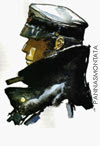9-11 Commission dealt with several issues by simply ignoring them
by James Ridgeway
December 6th, 2005 11:07 AM
On 9-11 the U.S. government faced a terrible decision: Should the military be ordered to shoot down other commercial airplanes full of civilian passengers, so that they, too, would not be used as missiles? Vice President Dick Cheney, although not part of the National Command Authority, gave the orders, although under the Constitution the vice president has no authority to command the military. The 9-11 Commission dealt with this fundamental issue by ignoring it. Among the other 9-11 topics the commission ignored:
• In the six months before 9-11, Federal Aviation Administration senior officials received 52 intelligence briefings regarding threats from Al Qaeda, warnings that mentioned hijacking, according to a commission staff study. The study was not part of the final commission report. The Bush administration blocked release of that information until after the 2004 election, and well after publication of the final commission report.
• The hijackers easily eluded CIA surveillance. Two of them landed in California in 2000, where they were greeted by an FBI informant, who actually rented one of the hijackers an apartment. FBI agents, then under Louis Freeh, remained clueless—either the informant didn't tell them what was going on or they didn't act on what they were told. Efforts by the Joint Inquiry of Congress to interview the informant were blocked by the FBI, which actually hid the man from congressional investigators. Top FBI officials refused to take subpoenas put in their hands by Senator Bob Graham. The 9-11 Commission never pursued this obvious obstruction of Congress.
• The Joint Inquiry traced the flow of money from the Saudi royal family and government institutions to a Saudi spy in California who had contact with the hijackers. The commission found Saudi Arabia blameless, although behind closed doors the staff is said to have demanded an airing of the situation.
Amid international outrage over the recent hotel bombings in Jordan, 11 top Jordanian intelligence officials, including the national security adviser and a former prime minister, resigned. In contrast, after 9-11, U.S. officials responsible for the nation's security were promoted or got lucrative jobs outside the government. George Tenet, head of the CIA during the worst intelligence debacle in the agency's history, got a Medal of Freedom. FBI director Freeh left government for private business and has written a book promoting himself as the man who solved the mystery of the stain on Monica Lewinsky's dress. Robert Mueller, his successor, blocked the congressional investigation of the FBI's role in the California informant scandal.
Jane Garvey, head of the FAA on 9-11, left to take a position with communications consultant APCO Worldwide, which carries this biography of her: "Garvey's legacy as administrator includes leading the FAA through one of the toughest chapters in all our history, restoring America's confidence in air travel, and strengthening airline safety. Under the leadership of Jane F. Garvey, U.S air travel is safer, more efficient, and the FAA is poised for continued success."
James Ridgeway is the author of The Five Unanswered Questions about 9-11 (Seven Stories Press).
See also:
Open and Shut
Four years later, we still have ten big questions
by Jarrett Murphy
Τετάρτη, Δεκεμβρίου 07, 2005
Εγγραφή σε:
Σχόλια ανάρτησης (Atom)



Δεν υπάρχουν σχόλια:
Δημοσίευση σχολίου